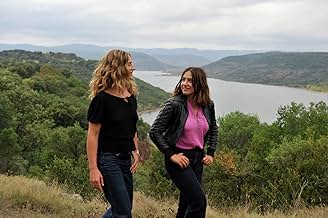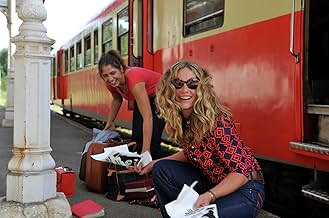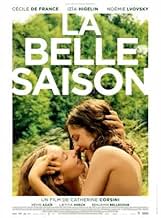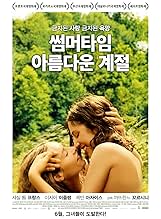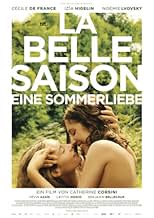PUNTUACIÓN EN IMDb
6,7/10
6,1 mil
TU PUNTUACIÓN
Una joven se traslada de la campiña francesa a París y comienza una apasionada relación amorosa con una líder feminista.Una joven se traslada de la campiña francesa a París y comienza una apasionada relación amorosa con una líder feminista.Una joven se traslada de la campiña francesa a París y comienza una apasionada relación amorosa con una líder feminista.
- Dirección
- Guión
- Reparto principal
- Premios
- 3 premios y 8 nominaciones en total
Cécile de France
- Carole
- (as Cécile De France)
Natalie Beder
- Marie-Laure
- (as Nathalie Beder)
Reseñas destacadas
An enjoyable film, with some great performances; but less travelled country roads should be rather more bumpy.
While a far from novel story, the three female leads (Izïa Higelin, Cécile de France and Noémie Lvovsky) give pitch perfect performances.
Where this film falls down is in giving the two lovers, far too smooth a ride. If you're fighting for freedom, surely the establishment would offer far more resistance? Here, the revolutionaries hardly seem to experience any push-back. There's one bump in the road, but that's really it.
While a far from novel story, the three female leads (Izïa Higelin, Cécile de France and Noémie Lvovsky) give pitch perfect performances.
Where this film falls down is in giving the two lovers, far too smooth a ride. If you're fighting for freedom, surely the establishment would offer far more resistance? Here, the revolutionaries hardly seem to experience any push-back. There's one bump in the road, but that's really it.
Watching this film in the start of 'pride month.'
Summertime is an engaging love story in the 70's. This is a very sensitive portrayal of two women from different backgrounds in conservative, rural France. Set in the early 70s in the first flush of modern feminism, the plot is pretty simple and the issue simpler - will they stay together against the pressures of rural society? The film is very realistic as it deals with woman rights and also portrays the societal views on lesbian culture in the 70's. This is a very good representation of LGBTQ in the films.
As I was watching this film, I was very much reminded of another French film, "Blue is the Warmest Colour" which also deals with similar theme of lesbianism. I really love 'Blue is the Warmest Colour' and is my favourite romance film. However, this film is also a good film with good themes and lesbian representation. This film shows how it is to be a lesbian in a rural France in the 70's, how the society thinks of a girl involving with another girl.
Overall, it's a pretty good film which portrays a really interesting subject matter.
As I was watching this film, I was very much reminded of another French film, "Blue is the Warmest Colour" which also deals with similar theme of lesbianism. I really love 'Blue is the Warmest Colour' and is my favourite romance film. However, this film is also a good film with good themes and lesbian representation. This film shows how it is to be a lesbian in a rural France in the 70's, how the society thinks of a girl involving with another girl.
Overall, it's a pretty good film which portrays a really interesting subject matter.
I didn't much care for the first half of 'Summertime': a posse of beautiful, self-confident and middle-class young feminists assert their right to "to as they please" in the Paris of the 1970s. What is absent from the portrayal is any sense of the personal insecurity that cripples most of us; these sisters, it seems, can quite literally do anything for themselves. The film becomes more nuanced when it follows two of its protagonists (a lesbian couple) back to the farm in the country where one of them (Delphine) grew up, and whence she has now been summoned owing to the illness of her father. There's still some idealisation here: the family own their farm and live a simple peasant life. But the conflict between Delphine's familial and spatial sense of identity, and the new relationship she has forged in the city, is nicely portrayed, as is the guarded hostility of her mother and her local acquaintances to the choices she has made in her new life. Overall, it's not nearly as strong as 'Blue is the Warmest Colour', but it grew on me as I watched it.
This is a sensitive portrayal of two women from different backgrounds in conservative, rural France. Delphine, a country girl in Paris is introduced to feminism at a time (1971) shortly after the student riots in Paris, the bra-burning feminism of late 60s USA, and the teen-led cultural revolution in music, art and fashion. Paris was a world away from her farm in the Limousin. It is a film about feminism and lesbianism with strong female leads directed by an experienced female director who was, herself, a teenager at the time the film was set. As such it is authentic and tender, not titillating. It is a film about relationships, between Delphine and her mother, her Parisian girlfriend, the boy she is expected to marry and above all the conflict between the city and the country.
It is a film that could only be made in Europe and only set in the 70s and was justifiably nominated for a Lumiere, France's equivalent to the Golden Globes. Jellybeansucker should stick to sucking jelly beans and watching simplistic action movies. This is for those who prefer content to pace.
It is a film that could only be made in Europe and only set in the 70s and was justifiably nominated for a Lumiere, France's equivalent to the Golden Globes. Jellybeansucker should stick to sucking jelly beans and watching simplistic action movies. This is for those who prefer content to pace.
This story of a relationship between a farmer's daughter and the woman she meets in Paris is effective in some ways. Set in the early 70s in the first flush of modern feminism, the plot is pretty simple and the issue simpler - will they stay together against the pressures of rural society? Izia Hegelin makes an effective and believable daughter of the soil, struggling to reconcile her feelings and her ties to her land and family; in an underwritten role as her lover, Cecile de France is less effective but does her best. Some good scenes showing the sometimes silly behaviour of activists and their disconnect from real life. The ending seemed slightly unlikely to me in some ways. There are sex scenes but they are neither very erotic nor graphic. So - worth seeing, but only a moderately good film.
¿Sabías que...?
- CuriosidadesDirector Catherine Corsini stated that she named the two main characters Carole and Delphine after real life artists and feminists Carole Roussopoulos and Delphine Seyrig.
- PifiasAfter a swim in the pond, the girls lay out to take some sun. As Carole lays naked on the blanket resting her head on Delphine, her arms are raised and we can see she does not have any underarm hair. As the girls start to kiss and caress Carole's armpit is exposed again but this time full of underarm hair.
- ConexionesReferenced in Théo & Hugo: París 5:59 (2016)
- Banda sonoraL'Hymne du MLF, d'apres Le Chant des Marais
(Johann Esser/Wolfgang Langhoff/Rudi Goguel)
With the kind permission of Edition Peters Group
All rights reserved
Selecciones populares
Inicia sesión para calificar y añadir a tu lista para recibir recomendaciones personalizadas
- How long is Summertime?Con tecnología de Alexa
Detalles
- Fecha de lanzamiento
- Países de origen
- Sitio oficial
- Idiomas
- Títulos en diferentes países
- Un amor de verano (La belle saison)
- Localizaciones del rodaje
- Haute-Vienne, Francia(scenes in the country)
- Empresas productoras
- Ver más compañías en los créditos en IMDbPro
Taquilla
- Presupuesto
- 4.800.000 € (estimación)
- Recaudación en Estados Unidos y Canadá
- 35.322 US$
- Fin de semana de estreno en EE. UU. y Canadá
- 15.413 US$
- 24 jul 2016
- Recaudación en todo el mundo
- 3.778.938 US$
Contribuir a esta página
Sugerir un cambio o añadir el contenido que falta

![Ver Bande-annonce [OV]](https://m.media-amazon.com/images/M/MV5BMzZiZTVkNWItZGNjYS00ZDY2LWFkOGItZjhkNTk2NDQ3ZDE2XkEyXkFqcGdeQXRyYW5zY29kZS13b3JrZmxvdw@@._V1_QL75_UX500_CR0)


